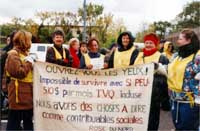Navigation
 Home
Home
 WHO WE ARE
WHO WE ARE
 OUR DEMANDS
OUR DEMANDS
 OUR ACTIONS
OUR ACTIONS
 OUR MAIN FIELDS OF ACTION: The Common Good and Access to Resources, Peace and demilitarisation, Women's Work and Violence against Women
OUR MAIN FIELDS OF ACTION: The Common Good and Access to Resources, Peace and demilitarisation, Women's Work and Violence against Women
 Become a member
Become a member
 News
News
 Agenda
Agenda
 Structure: IC, Countries and Participating bodies, International meetings
Structure: IC, Countries and Participating bodies, International meetings
 Newsletters
Newsletters
 Publications
Publications
 2000 - Sexism and Globalization, 2000 Good Reasons to March
2000 - Sexism and Globalization, 2000 Good Reasons to March
 2003 World Social Forum
2003 World Social Forum
 A Change of Course, The Millenium Development Goals (MDGs) through the Lens of the Women's Global Charter for Humanity, August 2005
A Change of Course, The Millenium Development Goals (MDGs) through the Lens of the Women's Global Charter for Humanity, August 2005
 A Score for Women’s Voices
A Score for Women’s Voices
 Advocacy Guide to Women's World Demands, 2000
Advocacy Guide to Women's World Demands, 2000
 Appeal of the World March of Women for the Construction of a Just, Equal, Cooperative, Democratic and Peaceful World
Appeal of the World March of Women for the Construction of a Just, Equal, Cooperative, Democratic and Peaceful World
 Changing the World Step by Step, 2000
Changing the World Step by Step, 2000
 ECONOMICS IN QUESTION: A WOMEN’S PERSPECTIVE
ECONOMICS IN QUESTION: A WOMEN’S PERSPECTIVE
 G8 AND WOMEN: WORLDS APART
G8 AND WOMEN: WORLDS APART
 Information about demand V-6 concerning sex trafficking of women and girls
Information about demand V-6 concerning sex trafficking of women and girls
 Information Document on Lesbian Rights (1999)
Information Document on Lesbian Rights (1999)
 Letter to Kofi Annan, UN General Secretary, October 17, 2000
Letter to Kofi Annan, UN General Secretary, October 17, 2000
 Letter to the IMF and the World Bank, October 16, 2000
Letter to the IMF and the World Bank, October 16, 2000
 Supporting Document 1 to the Charter
Supporting Document 1 to the Charter
 Supporting Document 2 to the Charter
Supporting Document 2 to the Charter
 The World March of Women 1998-2008: A Decade of International Feminist Struggle
The World March of Women 1998-2008: A Decade of International Feminist Struggle
 The World March of Women 2010 - Third International Action
The World March of Women 2010 - Third International Action
 WMW at the Global Forum on Financing the Right to Sustainable and Equitable Development
WMW at the Global Forum on Financing the Right to Sustainable and Equitable Development
 Women on the March, 2002
Women on the March, 2002

|
Abril 2002 - Erradicar la pobreza en todas las etapas de la vida
|
Satisfacción de las necesidades
sociales y económicas de base
Un techo propio
La vivienda es otra necesidad de base por satisfacer, las mujeres de Québec exigen un amplio plan de construcción de viviendas sociales (las canadienses, por su parte, piden que la parte del presupuesto federal atribuida a la vivienda social se aumente de 1%).
Reivindicaciones similares surgen en, Camerún, Chad, Honduras, la India, México, Nicaragua, República Centroafricana… mientras que en Francia y en Suiza, las mujeres exigen "para todas y todos una verdadera equidad en materia de acceso a las viviendas sociales acompañada de un programa gubernamental de adjudicación de viviendas para las personas sin techo o mal alojadas, en particular las mujeres solas, con o sin hijos".
En Venezuela, las mujeres exigen que se "garanticen a las amas de casa la vivienda y la seguridad social".
|
|

|
Derechos sociales para ellas también

Illustration : Magazine « Femmes prévoyantes Socialistes » (Belgique) |
Las mujeres reclaman con fuerza una ley (países del Medio Oriente y del Mundo árabe, Quebec) y políticas estatales dinámicas para acabar de una vez por todas con las situaciones de flagrante pobreza (Costa Rica, Ghana, Haití, la India, Túnez...).
Las luchas por conseguir y mantener los derechos sociales transcienden las diferencias entre países desarrollados y en desarrollo. Blanco principal de las políticas económicas neoliberales, los presupuestos sociales son las primeras víctimas de los siniestros recortes efectuados, en el marco de los Programas de Ajuste Estructural, con el propósito de reducir la deuda externa de los países pobres, condición que el Banco Mundial y el Fondo Monetario Internacional (FMI) imponen al conceder "ayuda" a estos países.
Más frágiles de un punto de vista social, menos presentes en el mundo laboral que los hombres o con puestos peor remunerados, las mujeres son las primeras en ser afectadas por tales programas.
|
Drawing from the platform of world demands, participating groups insisted that countries' foreign debt be cancelled and the resulting funds be allocated to social programs for women.
Other demands were made to ensure gender equality in this sphere (Bolivia, Brazil, India, Jordan, Kurdistan, Mexico, Tunisia). In New Zealand and in Europe, women showed concern over rising poverty and insecurity, and wanted current social systems to be "scaled upwards" so that women can "live with dignity."
"The money needed exists: excessive military budgets and the nuclear arms buildup expand to the detriment of satisfying [social] needs," a Frenchwoman wrote.
In Canada women demanded respect for social and economic rights, the right to receive their own social assistance, and an old age pension calculated on the basis of their individual income, not on the basis of family income.
This particular attention to older women with low incomes, especially if they did not have a job outside the home, was found in Bolivia, Brazil, Chile, Croatia, France, Haiti, Québec. Korean women called for special programs to be set up for women farmers and women with disabilities. Meeting in mid-April 2000, in Bucharest, Romanian, Ukrainian and Yugoslavian women emphasized the demand of recognition of women's unpaid work and protection for women who are doubly threatened (single women, older women, women farmers, young women, and women with disabilities).

Porque vivir dignamente es tener pan y rosas
(9 de octubre de 2000, Quebec).
(Foto Elisabeth Blanchet)
|

|
Copyrights
:
CC by-nc-sa 2.0
Last modified
2006-03-23 03:09 PM
This item is available in
Français,
English,
Español
|
|





